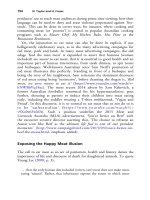The palgrave international handbook of a 302
Bạn đang xem bản rút gọn của tài liệu. Xem và tải ngay bản đầy đủ của tài liệu tại đây (27.52 KB, 1 trang )
Hunting and Shooting: The Ambiguities of ‘Country Sports’
299
Incident Investigation Scheme (WIIS), during the 10-year period 20022011, since the use and storage of carbofuran was made illegal, shows that
there have been 643 bird poisoning incidents where birds were poisoned
following the abuse of pesticides. Of these, 317, or just under a half (49 %)
involved carbofuran. A significant proportion of crime intelligence reports
to the police National Wildlife Crime Unit (NWCU) related to raptor
poisonings in Scotland, most of these involving carbofuran. Further, police
intelligence suggested that supplies of the pesticide were being accessed
from outside the UK. The NWCU have reaffirmed the continuing seriousness of the issue by identifying raptor persecution as one of six key wildlife
crime priorities in the UK. The conclusion, published in their 2013
Strategic Assessment, was that, ‘Intelligence continues to indicate a strong
association between raptor persecution and grouse moor management’
(NWCU 2013, p. 25).
The issue of raptor poisoning was twice discussed by the House of
Commons Environmental Audit Select Committee (2004, 2013) considered
environmental and wildlife crime in both 2004 and 2012–2013. The committee noted, in its 2013 report, the particular difficulties associated with the
remote locations in which the majority of offences occurred: this hampered
developing an accurate assessment of the extent of the problem, hindered the
gathering of evidence and made bringing prosecutions difficult. As Akella
and Cannon (2004) have argued, uncertainties regarding the ‘dark figure’ of
wildlife crime represents one of the major difficulties in addressing the
problem. Noting that the worst problems appeared to be related to some
of the less well-managed estates, it went on to recommend the adoption of a
multi-agency approach for working with major landowners and rural interests and tough action to control pesticides (HoC: EASC 2013, pp. 15–19).
In Scotland, in addition to the poisoning incidents depicted in Fig. 2 and
wider habitat loss or destruction, 322 further birds of prey were known to
have been shot, trapped and killed or subjected to nest destruction, in the 20
years leading to 2009. These included, five red kites, 17 golden eagles, one
white-tailed eagle, 137 buzzards, 60 peregrine falcons, 49 hen harriers, 11
goshawks, 13 sparrow hawks, 26 kestrels, one osprey and one tawny owl. Of
particular concern to RSPB investigators has been the apparent disinclination
of the courts to pass more than ‘moderate’ sentences on those found guilty.
Indeed, in 17 % of cases, the accused were merely ‘admonished’ or given an
absolute discharge. Such sentencing contrasts significantly with the pattern of
sentencing of persons found guilty of egg theft (see section on Egg
Collecting), despite the fact that poisoning, shooting and otherwise killing
birds has a far greater detrimental effect on the overall raptor populations.









